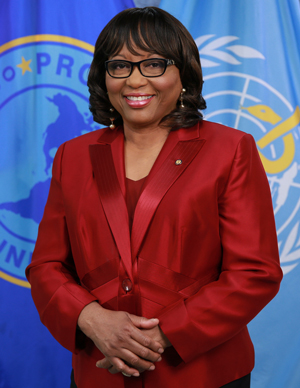Only one in ten people have been vaccinated against COVID-19 in the region, where “hospitals are full, variants are rapidly circulating,” and “vaccines are urgently needed today.”

Organization (PAHO) Carissa F. Etienne
Following the G7 nations’ promise to donate 1 billion vaccine doses to countries in need, Pan American Health Organization (PAHO) Director Carissa F. Etienne urged them to prioritize Latin America and the Caribbean. “Those countries that are suffering the most should be at the front of the line,” she said.
During her weekly media briefing, she pointed out that only one in ten people in Latin America and the Caribbean have been fully vaccinated against COVID-19. “Yet we are a region of more than 600 million people where cases are mounting, hospitals are full, and variants are rapidly circulating,” she said, adding that “vaccines are urgently needed today.”
Reporting on the pandemic’s deadly trajectory, Dr. Etienne said that more than 1.1 million new COVID-19 cases and 31,000 deaths were reported in the past week in the Americas, including the United States and Canada. For the past few weeks, four of the five countries with the highest weekly death counts in the world have been in the Americas.
“While vaccines are needed everywhere, we hope G7 nations will prioritize doses for countries at greatest risk,” she said, referring to those in Latin America and the Caribbean that have not yet received enough vaccines to protect even the most vulnerable.
At the same time, she said, vaccine acceptance is high in Latin America and the Caribbean, where “people are eager for a chance to get vaccinated.”
“I want to be clear that the primary issue in the Americas is vaccine access, not vaccine acceptance,” she said. “Across Latin America and the Caribbean, we have a long legacy in immunization and trust in the life-saving power of vaccines. Once new doses are available, countries are ready to distribute them as quickly as they arrive and PAHO will work tirelessly to get vaccines to every corner in our region, until this pandemic is behind us.”
Along with vaccines, the region needs financial support for additional supplies, she said. The region also needs to ramp up its own manufacture of vaccines.
As vaccines arrive in the region, Dr. Etienne suggested they should go first to populations at high risk of developing severe COVID-19 cases, such as the elderly, frontline health workers and people with pre-existing conditions. Health workers, in particular, should be prioritized because they are vital for response to the pandemic and “are also some of the most trusted voices for vaccines,” she said.
“People turn to health workers – including doctors, nurses, and community health workers – for medical advice, so we must ensure that our health workers have the information they need to answer their communities’ and their own families’ questions,” Dr. Etienne affirmed.
“I want to remind citizens that the vaccines authorized by WHO (World Health Organization) and delivered through COVAX have been thoroughly assessed by experts. So, when it’s your turn to get vaccinated, embrace what’s available to you and don’t delay your vaccination,” she said, urging people to make sure to get their second doses.
Dr. Etienne detailed the pandemic’s course, noting that Mexico reported a slight increase in cases due primarily to the Baja California and Yucatan regions. In the Caribbean, Cuba and the Dominican Republic are reporting most new cases, while Trinidad and Tobago is still reporting high death rates.
In Central America over the past two weeks, infections have been rising in Belize, Panama, and Guatemala while in Honduras and Costa Rica, cases are beginning to decline.
Further south, the pandemic is filling hospitals in Bolivia, Chile, and Uruguay, and most patients are younger people between 25 and 40 years old. In the Brazilian city of Sao Paulo, 80% of ICU beds are filled by COVID patients. Colombia’s large metropolitan areas are also seeing very high ICU bed occupation.
“Against this backdrop, we urge countries to tighten public health measures in places with high transmission,” Dr. Etienne said. “This is the most effective way to bring cases down until we have enough vaccines for everyone.”










![.[L-R] Parliamentary Representative for Castries Southeast, Lisa Jawahir & Talk show host, Timothy Poleon](https://thevoiceslu.com/wp-content/uploads/2026/02/Lisa-Jawahir-Timothy-Poleon-380x250.jpg)
![Public Service and Utilities Minister Stephenson King delivered remarks [Photo credit: VP]](https://thevoiceslu.com/wp-content/uploads/2026/02/Stephenson-King-380x250.jpg)

